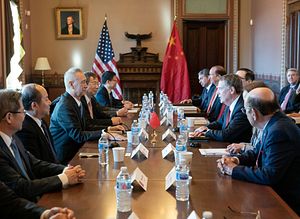On February 19, the Chinese Commerce Ministry released a one-sentence statement, announcing that “at the invitation of the United States,” Liu He — special envoy of Chinese President Xi Jinping, member of the Political Bureau of the Chinese Communist Party Central Committee, vice premier of the State Council, and top negotiator of the China-U.S. Comprehensive Economic Dialogue — is to visit Washington for the seventh round of high-level consultations on China-U.S. trade from February 21 to 22.
In comparison, the statement released by the White House was far more detailed. The White House said that a series of meetings — including deputy-level meetings and principal-level meetings — are to begin on February 19.
Most importantly, the White House stressed that “The meetings are a part of the agreement reached by” both presidents in Buenos Aires on December 1, 2018, “to engage in 90 days of negotiations with a view to achieving needed structural changes in China that affect trade between the United States and China. ”
“The two sides will also discuss China’s pledge to purchase a substantial amount of goods and services from the United States,” the White House added.
Notably, again and again, the United States highlights the “needed structural changes in China” in all its statements on trade talks. But that critical point of emphasis for the United States would always be intentionally played down or even completely omitted in Chinese announcements.
Despite, or perhaps because of, such delicate manipulation of information, China has shown increasing signals that it is ready to reach a deal with the United States now.
China’s attitude toward the U.S.-China trade friction has switched from belligerence to silence and now to optimism.
In the very beginning, China repeatedly vowed, “We have the confidence and capability to counter any measure of trade protectionism taken by the United States.”
During this period, Chinese state media released a large number of articles blaming U.S. hegemonism for the issue.
As the U.S.-China trade talks continued, Chinese state media suddenly cooled down its criticism of Washington. As The Diplomat noted earlier, after Liu He met with U.S. President Donald Trump in the Oval Office on January 31, not a single piece of news about this significant meeting was broadcast by China’s TV stations.
Last week, after the latest round of U.S.-China trade negotiation wrapped up in Beijing, President Xi Jinping met with both delegations at the Great Hall of the People. This meeting was broadcast in a high profile in China. Yet Chinese state media’s focus was on how Xi encouraged both sides to reach a “win-win” deal.
“I have repeatedly said that China and the United States cannot be separated from one another. Only through cooperation can a win-win situation be attained, and confrontation will certainly lead to a lose-lose scenario. Cooperation is the best choice for both sides,” Xi told both delegations, according to Xinhua.
Interestingly, soon after this meeting, Chinese state media broke its silence and released a series of reports expressing optimism.
A group of reporters from the Chinese state TV network, CCTV, interviewed multiple experts at home and abroad. All these experts expressed that a trade deal would be good for both nations. It’s obvious that CCTV’s reporters had been preparing for this specific interview for a long time.
Even the Global Times, one of China’s most nationalist state-run newspapers that has been constantly criticizing the United States, said recently that “We hope the Chinese and U.S. delegations steadily promote a good result in their talks.”
Chinese state media’s change of attitude implies that China aims to complete the negotiations by the March 1 deadline.
































